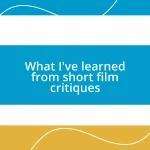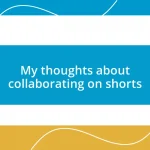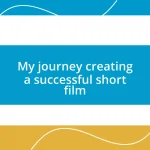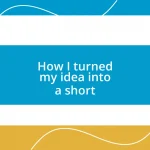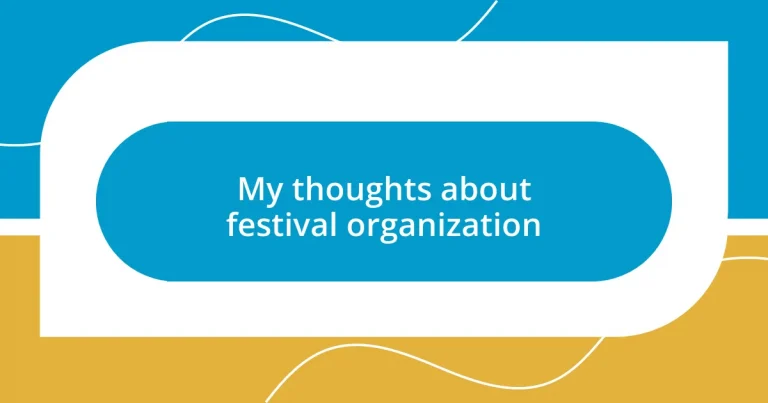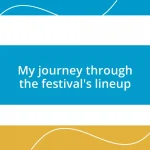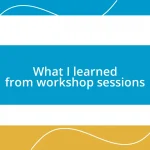Key takeaways:
- Building a cohesive team with clear objectives boosts motivation, collaboration, and successful festival outcomes.
- Effective budgeting and resource allocation are essential to prevent unexpected costs and ensure strategic planning.
- Engaging the community and gathering feedback enhances the festival experience while fostering inclusivity and continuous improvement.
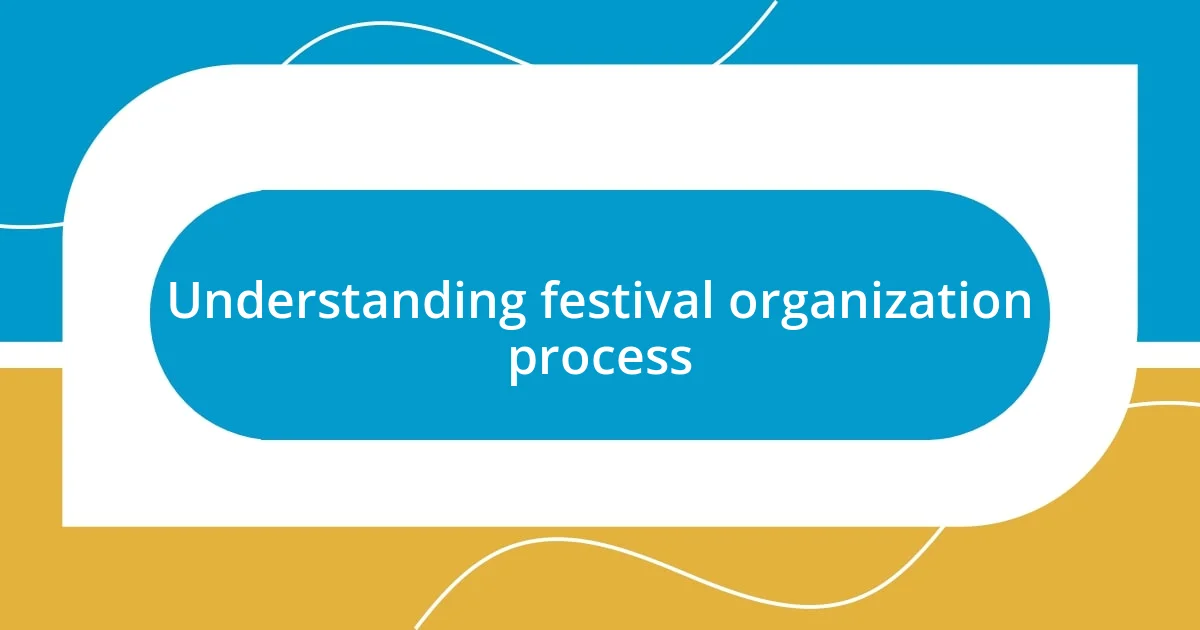
Understanding festival organization process
Understanding the festival organization process is a fascinating journey. I vividly remember the first festival I helped organize; it felt overwhelming but exhilarating. Each step—from securing permits to choosing the right vendors—was a puzzle waiting to be solved.
One of the crucial aspects I found is the importance of building a team. Collaborating with passionate individuals can turn a daunting task into a shared adventure. Have you ever worked with a group where everyone’s enthusiasm ignited your own? I know I have, and those moments often lead to the most creative solutions and unforgettable experiences.
Communication plays a vital role throughout this process. I learned early on that keeping everyone aligned helps avoid misunderstandings. How do you ensure that everyone is on the same page? Personally, I’ve found that regular meetings and updates create a sense of unity and purpose, transforming a group of individuals into a cohesive team with a shared vision.
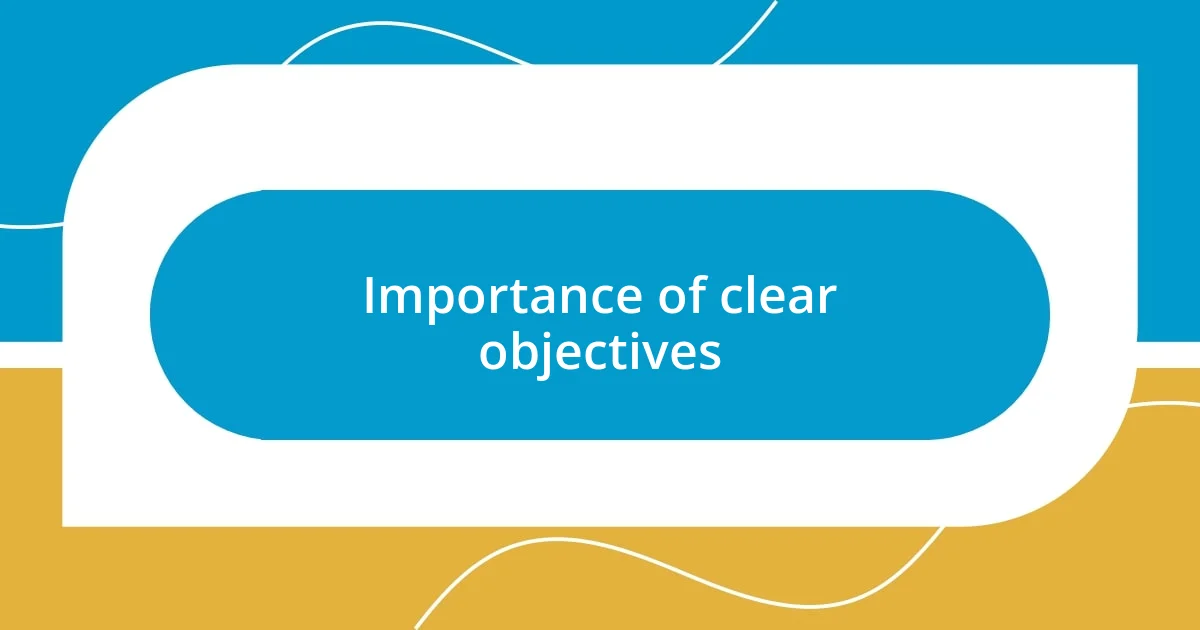
Importance of clear objectives
Having clear objectives when organizing a festival is like having a map for a road trip; it guides every decision. I remember one festival where we didn’t outline our goals clearly. The result was chaos! We had different teams working toward different outcomes, and that led to confusion about our budget and timeline. Focused objectives not only align the team but also streamline the planning process.
Here are some key benefits of establishing clear objectives:
- Direction: Provides a clear path, ensuring everyone knows what they’re working towards.
- Motivation: Sparks enthusiasm among team members, keeping spirits high.
- Evaluation: Makes it easier to assess the festival’s success against set benchmarks.
- Resource Allocation: Assists in organizing time, money, and personnel effectively.
- Problem Solving: Helps quickly identify solutions when obstacles arise.
When everyone on the team shares a common vision, it creates an environment of collaboration and creativity. For me, witnessing how clear goals can turn scattered efforts into a streamlined operation has been incredibly fulfilling. It’s rewarding to see everyone clearly inspired, driving each part of the project forward with purpose.
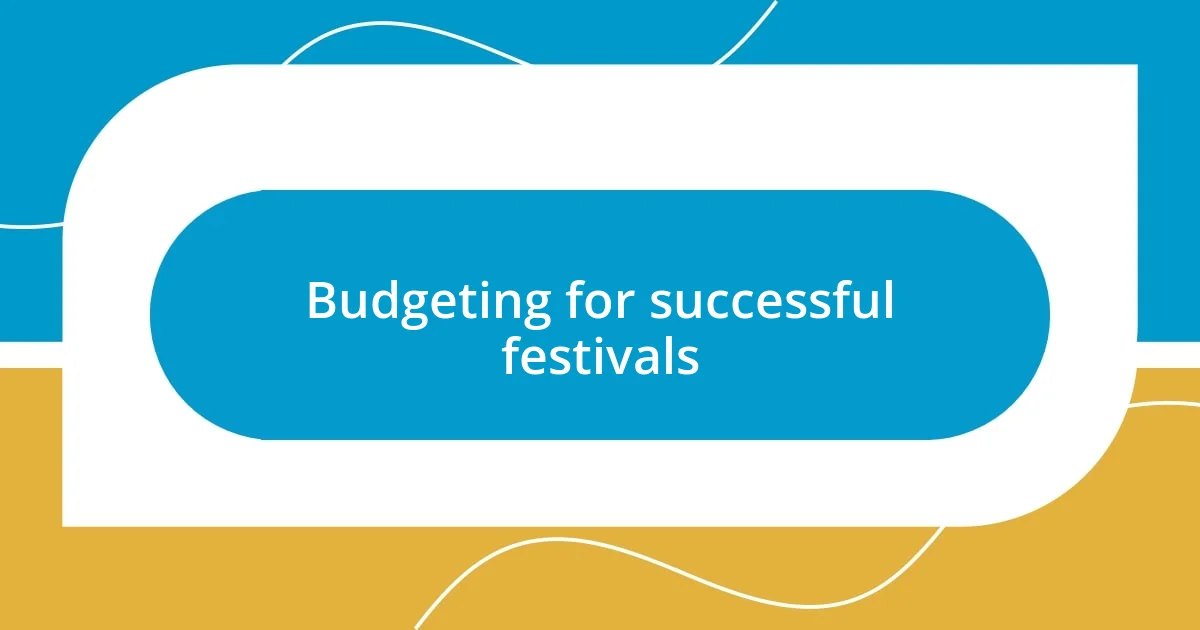
Budgeting for successful festivals
Budgeting is a fundamental element in organizing a successful festival. In my experience, keeping a clear and detailed budget can make or break the event. During one of my earlier festivals, I learned this lesson the hard way when unexpected costs completely derailed our plans. It was a huge wake-up call; now, I prioritize understanding every expense and leave room for contingencies.
To ensure a well-rounded budget, I found it effective to categorize expenses into essential and optional. Essential costs include permits, venue rentals, and equipment, while optional costs might involve additional entertainment or decorations that enhance the experience but aren’t absolutely necessary. It’s a balancing act—assessing what adds real value to the festival versus what can be sacrificed. Have you considered what aspects of your festival could be trimmed without diminishing the experience? I often reflect on this when planning, which helps keep my budget in check.
Ultimately, I believe that successful budgeting isn’t just about numbers; it’s about strategy and foresight. Embracing a proactive approach allows us to spot potential issues early on. Plus, it fosters a sense of confidence within the team. When everyone knows the financial boundaries, there’s less stress regarding how funds will be allocated throughout the planning process.
| Category | Essential Costs | Optional Costs |
|---|---|---|
| Permits | ||
| Venue Rental | ||
| Staff Wages | ||
| Extra Entertainment |
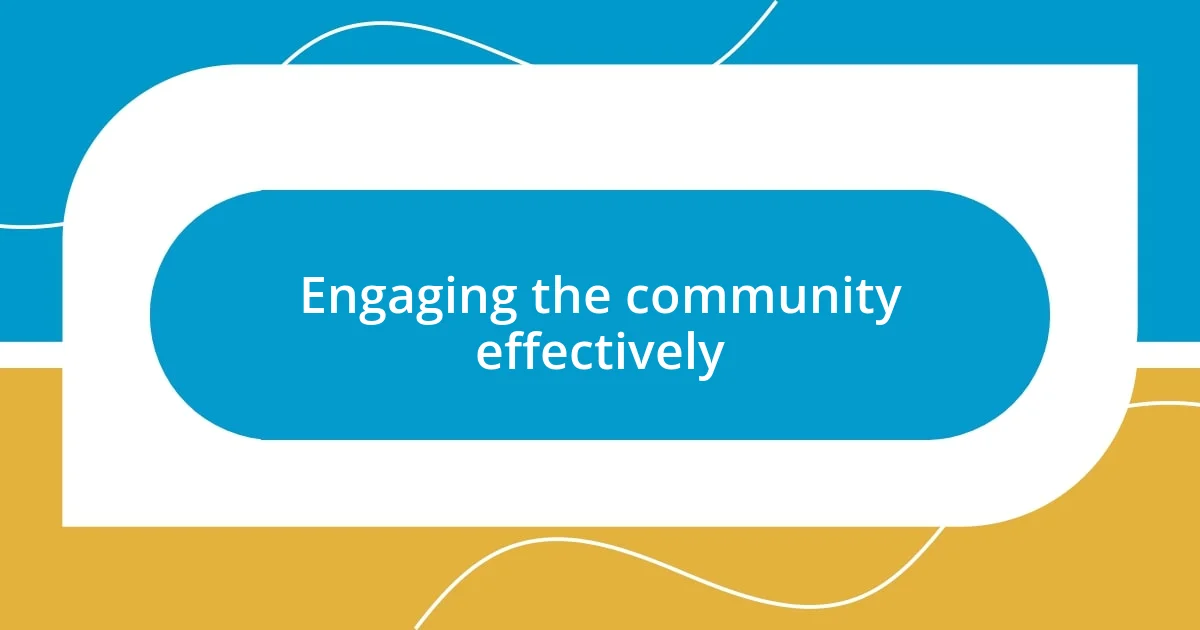
Engaging the community effectively
While organizing festivals, engaging the community effectively is crucial. From my experience, the best way to foster that connection is by inviting local voices into the planning process. For instance, during one festival, we hosted a community forum where anyone could share their ideas or concerns. The excitement in the room was palpable; it was clear people felt valued and eager to contribute. I often wonder, how can we create spaces where everyone feels heard? This input not only enriched our festival programming but also created a strong sense of ownership among participants.
Building relationships with local businesses and organizations is another vital component of effective community engagement. I remember partnering with a nearby farmer’s market for one event, and it did wonders for our food offerings and atmosphere. Not only did we get fresh produce, but their loyal customers came out in numbers, effectively doubling our attendance. Have you considered how local partnerships can be mutually beneficial? When we collaborate with the community, we create more than just a festival; we establish a vibrant celebration that resonates deeply.
Lastly, promoting volunteer opportunities can ignite community interest and investment. I’ve seen firsthand how passionate volunteers can elevate an event. At one festival, a group of enthusiastic teens stepped in last minute, bringing fresh energy and ideas. Their passion was infectious, and it reminded me of the power of collective effort. Are you tapping into the passion of your community? By engaging volunteers, we unlock a diverse pool of creativity, enthusiasm, and a genuine connection to the event that can make it truly special.
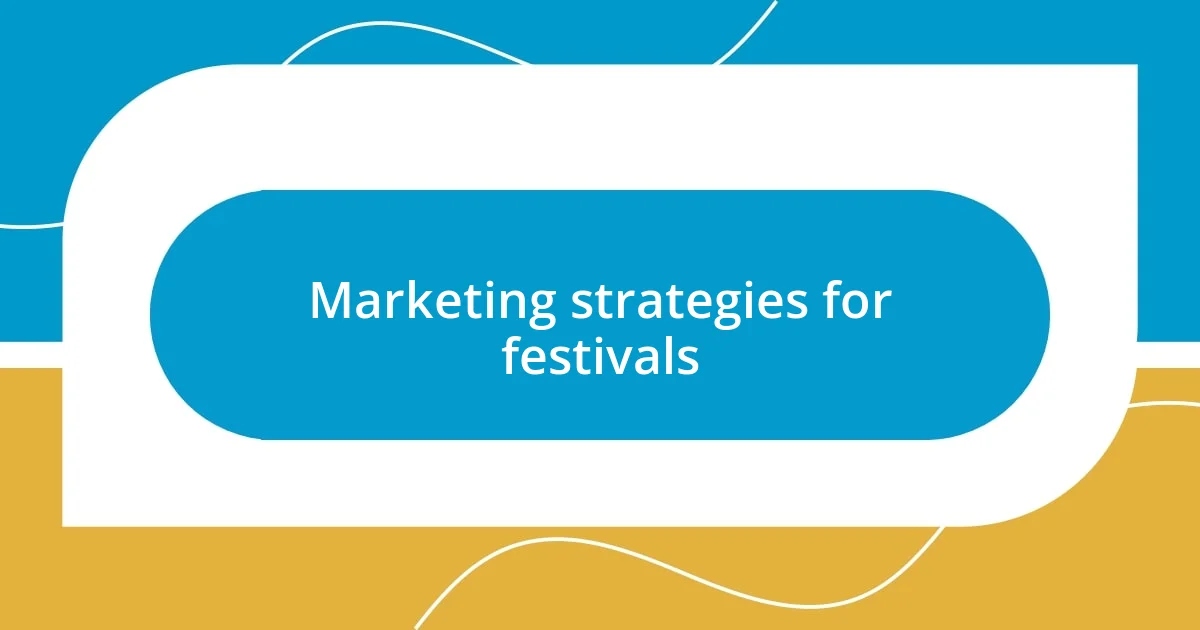
Marketing strategies for festivals
When it comes to marketing strategies for festivals, I’ve found that leveraging social media platforms is invaluable. During one festival, we created a hashtag that not only encouraged attendees to share their experiences but also drew in an online audience. It was amazing to see how user-generated content resonated with our community, creating a buzz that traditional advertising simply couldn’t match. Have you thought about how social media can amplify your festival’s reach?
Email marketing also holds immense potential. In my early organizing days, I maintained a mailing list of festival-goers which proved crucial for keeping them in the loop about lineups, ticket sales, and special promotions. I distinctly recall sending a sneak peek of an artist lineup, and the excitement it generated was palpable. It’s all about cultivating a sense of anticipation, and nothing beats that direct line of communication. Do you have a strategy for connecting with your audience through email?
Another strategy I’ve embraced is collaborating with influencers or local personalities. I remember teaming up with a beloved local chef who not only promoted our food stalls but also hosted live cooking demos at the festival. This synergy created a unique draw for food enthusiasts, and their followers flocked to the event. It made me realize that the right partnerships can elevate the festival experience while bringing in new audiences. Are you exploring local talent that can amplify your vision? Each collaboration opens up a world of creative possibilities.
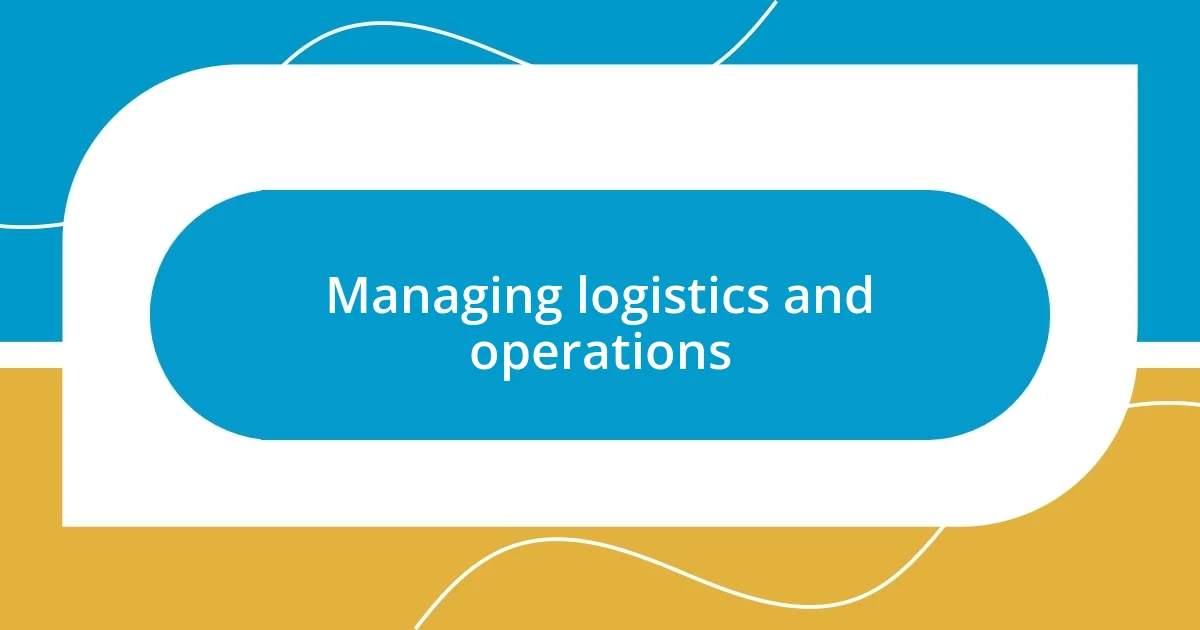
Managing logistics and operations
Managing logistics and operations is where the magic of a festival often happens behind the scenes. I distinctly remember the chaos of setting up a festival stage just hours before the event started. The arrival of equipment, sound checks, and coordinating with various vendors felt like a well-choreographed dance. Have you ever witnessed how vital timing and communication are in such moments? Getting everyone on the same page was essential to ensure everything ran smoothly – and let me tell you, when it all came together, the relief was palpable.
Having a solid plan for logistics is indispensable, but don’t underestimate the importance of flexibility. During one festival, a sudden rainstorm threatened to wash everything away. Instead of panicking, we quickly adapted our layout to include more tents and covered areas, which not only saved the day but also added an unexpected twist to the festival’s atmosphere. It showed me that being nimble allows you to turn challenges into opportunities. How can you prepare your team to handle on-the-fly changes?
Another key aspect I’ve learned is the significance of clearly defined roles among the team members. Early in my organizing journey, I faced a situation where volunteers were unsure of their tasks. This led to confusion and delays in setup, which can feel like a ticking time bomb as the clock counts down to event time. Since then, I’ve implemented detailed briefings before each festival, ensuring everyone understands their responsibilities. Think about your team’s structure: are they empowered and clear about their roles? Empowering individuals creates a sense of ownership, which can be incredibly motivating.
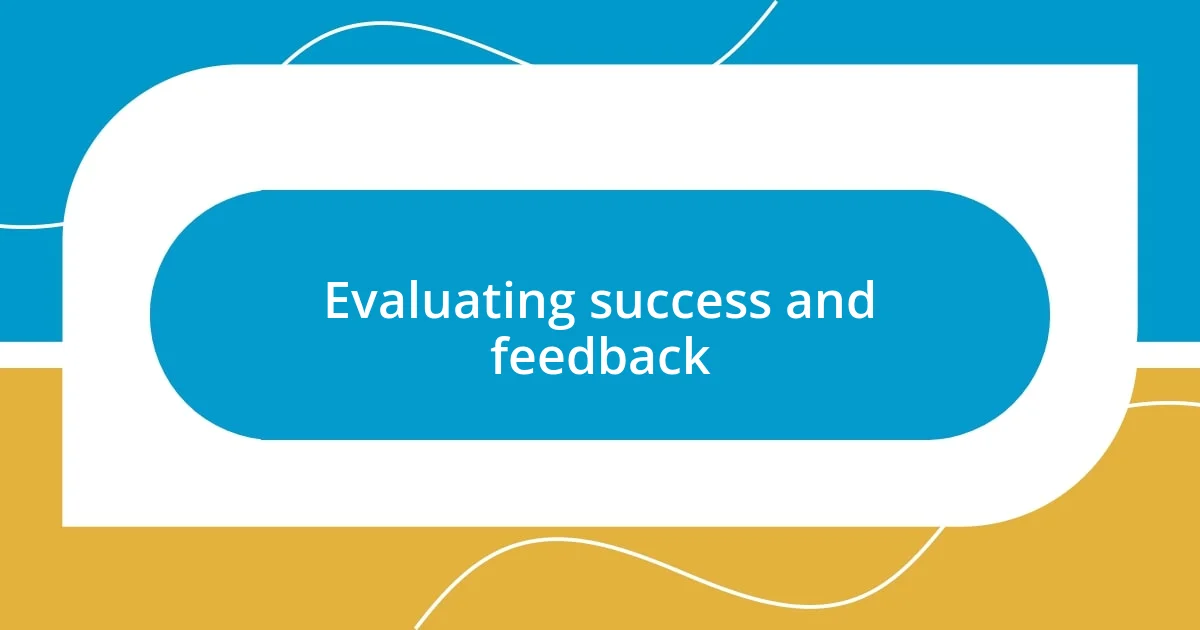
Evaluating success and feedback
Evaluating the success of a festival is about more than just attendance numbers; it’s also about the intangible feelings of satisfaction among attendees. I recall one festival where, despite a lower turnout, the atmosphere was electric. People were raving about the diverse lineup and engaging activities. It made me realize that when attendees leave with memories instead of just moments, that’s a true sign of success. Have you ever assessed your festival’s success beyond just the metrics?
Gathering feedback becomes the compass for future improvements. After one event, I initiated a quick post-festival survey and was surprised by the depth of insights shared. Attendees expressed their thoughts on everything from the food choices to the layout, revealing hidden opportunities for growth. I learned that direct feedback not only shows what worked but also highlights areas needing attention. What methods do you have in place to collect feedback from your festival-goers?
Lastly, embracing both praise and criticism is crucial in this evaluation process. I remember receiving a candid review on social media about the lack of vegetarian options at a festival. Instead of feeling defensive, we took it as an opportunity to diversify our food offerings the following year. That change not only met a demand but also fostered a sense of community inclusion. How do you plan to react to the feedback you receive? Turning critiques into actionable changes can truly elevate your festival experience.


